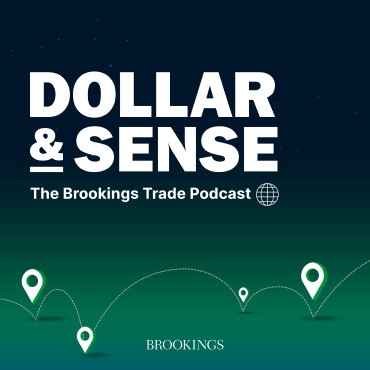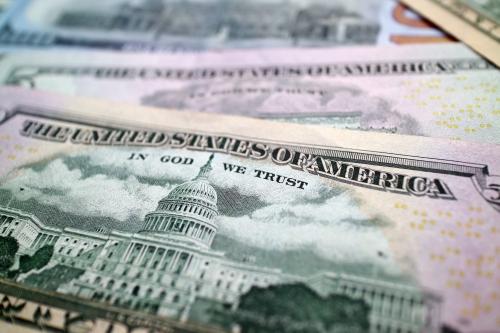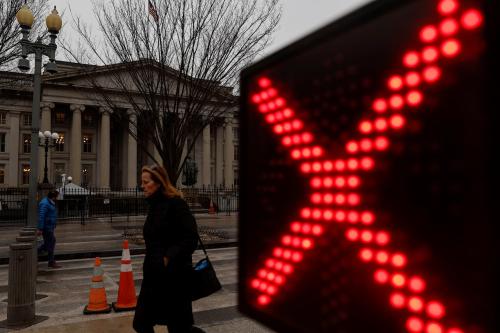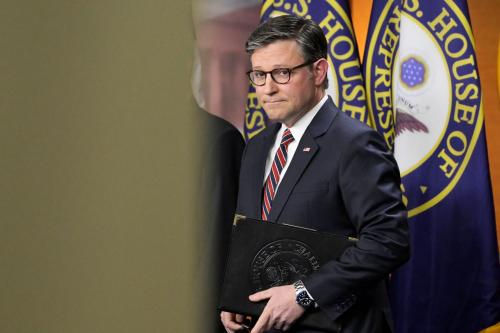David Wessel, senior fellow and director of the Hutchins Center on fiscal and Monetary Policy at Brookings, joins host David Dollar to discuss what’s in the debt ceiling deal reached between President Biden and House Speaker Kevin McCarthy. The deal, signed into law by the president on June 2, averts a debt default that was expected as early as June 5. Wessel explains the deal’s broad provisions, it’s impact on fiscal policy, and whether it resolves the long-term budget and debt issues.
- Listen to Dollar & Sense on Apple, Spotify, Google, or wherever you like to get podcasts.
- Learn about other Brookings podcasts from the Brookings Podcast Network.
- Sign up for the podcasts newsletter for occasional updates on featured episodes and new shows.
- Send feedback email to [email protected].
TRANSCRIPT
[music]
DOLLAR: Hi, I’m David Dollar, host of the Brookings trade podcast Dollar and Sense. Today we’re going to try to make sense out of the debt ceiling deal. We’ve got the ideal guest for this. David Wessel, director of the Hutchins Center on Fiscal and Monetary Policy at Brookings. So, welcome to the show, David.
WESSEL: Good to be with you, David.
DOLLAR: So, both houses of Congress have passed this debt ceiling agreement. We’re talking on Friday, June 2nd, and we expect President Biden to sign this very quickly. So, David, what are the main features of this deal that was largely negotiated between President Biden and Speaker McCarthy?
WESSEL: So, the bill, the 99 page bill, does a couple of big things. It sets ceilings on annually appropriated spending. That’s about a quarter of all federal spending, the stuff that Congress has to vote on every year. It sets ceilings for those for the coming fiscal year and the one after that. It allows for an increase in defense spending and a very modest cut in domestic spending. It’s very complicated because there are all sorts of side agreements.
But basically the era of big, big increases in annually appropriated spending are over. But the cuts aren’t very big, especially compared to what the Republicans were wanting.
It also puts off another showdown over the debt ceiling until sometime in early 2025, much to the [relief] of think tank scholars and reporters on the budget. And it has some provisions to make government shutdown this fall much less likely than there might have been, given that we have divided government.
On balance, it doesn’t do much to change the trajectory of the rising federal debt because it doesn’t touch the big movers, it doesn’t touch Social Security, it doesn’t touch health care, and it doesn’t touch taxes. And it also won’t have much near-term effect on the economy. It’ll be a minor slowing effect on the economy, maybe a tenth or two-tenths of a percentage point of GDP and growth. But all the other things going on in the economy—the Fed, energy prices, climate change, the war in Ukraine, business confidence and all—that are much more important factors.
DOLLAR: So, what does President Biden get out of this deal? What does Speaker McCarthy get out of this deal? And most important, what Americans want to know is who won?
WESSEL: I think both Speaker McCarthy and President Biden come out of this looking pretty good. They seem to have found a way to negotiate in a climate where everybody thought they were spitting at each other. McCarthy delivered a compromise that didn’t get all the Republicans in the House, but it got a lot of them. And it also got through the Senate with a lot of Republicans voting against it. But he showed that he can strike a deal and get the votes, which was in question.
What Biden got was a very modest restraint on federal spending and probably what he would have gotten if we hadn’t had a debt ceiling showdown. And it also strengthens his hand that, like everybody thinks, I was foolish to negotiate with the Republicans, but look, we negotiated and we got a deal that frankly, I think looks pretty good for the Democrats.
If I had to pick a winner, I would say Biden and the Democrats won. They got all sorts of stuff that the Republicans wanted to kill from last year’s big spending on infrastructure and climate change—that stays. The other provisions of the bill that involve work requirements for food stamp recipients and some changes in the way the federal government handles permitting for various energy projects are pretty mild and the administration has a lot of control about what happens.
So, I would say both McCarthy and Biden are politically stronger because they showed they can govern. If you want to score who won, I would say Biden won.
DOLLAR: Okay, that’s very helpful. Let’s talk a little bit more about the effect on the economy. You already suggested that this is going to be modest, but let’s go into a little bit more detail. What’s the effect of this debt ceiling agreement on the economy? And a particular question I’m interested in is does this make the Fed’s job easier? Does this in some sense substitute for a 25 basis point increase in the Fed’s policy rate? I’d like to hear your thoughts on this.
WESSEL: All right. So, when the federal government spends less money, that tends to subtract from GDP growth. The federal government will spend less money in fiscal year ‘24 and ‘25 than has been projected, or at least as long as all of this holds together. So that’ll have a modest negative effect on GDP growth.
On the other hand, we just lifted a major uncertainty over the economy, that is would the United States default on its obligations. And that was really hanging over not only financial markets, but businesses and maybe even some citizens.
So, on balance, it’s a minor slowing of the economy at a time when, as you point out, the Fed is trying to slow the economy. So, this helps the Fed a little. It particularly helps them because it gives them more certainty about what the next couple of years look like, more certainty than they had before. I don’t think it’s big enough to substitute for a quarter point increase in the Fed’s policy rate. I think a much bigger issue for the Fed is how much the recent banking problems are leading banks across the economy, even those that are strong, to pull back on lending. And that’s the thing they’re having a hard time figuring out.
Fed policymakers meet at the middle of June, and they’re widely expected to, the word of the day is “skip” a rate increase this time, but leave open the door to raising rates in July. As you noted, we’re recording this on Friday, June 2nd, we just got the employment numbers and they’re very strong. So, the labor market is still strong and inflation is coming down, but at a very gradual pace. So, that leads me to believe that the Fed will be doing more rate increases in the months ahead … probably. That this action, fiscal policy, helps a little bit, but it doesn’t make that much difference.
DOLLAR: If I could ask a slightly technical question, in the lead up to this agreement, Treasury has run down its cash account, basically, and now it’s going to have to build that up. Is that significant enough to really make a difference in financial markets and in the economy? Is this an additional short term factor that we should think about in how this deal affects … not the deal so much as the whole process affects the economy?
WESSEL: Yeah, it’s a really interesting question. So, the Treasury has been borrowing less money than it would have ordinarily because it was bumping up against the debt ceiling, and it has run down the amount of money and what effectively is their checking account from the usual five or $600 billion to about $30 billion.
So, over the next several months, they’re going to have to raise, they’re going to have to borrow, a lot of money: $600 billion. And there’s this group of bond market advisers to the Treasury, it’s called the Treasury Borrowing Advisory Committee, and the Treasury has asked them, and they make this public, how quickly do you think we can raise $600 billion without screwing everything up? And there was some talk about maybe it would take about three or four months, because if they try and raise too much money quickly, that could push up short term interest rates and that could complicate things from the Fed, because the Fed would then have to decide, are rates going up too much and do we have to offset that?
So, it is a problem. I think it’s a manageable problem. Usually in these things, it’s a lot easier for the markets to adjust when they know what’s coming. This isn’t a surprise like COVID or a bank failure. So, what I expect will happen is the Treasury will be very transparent about what their borrowing plans are. So, both the private sector and the Fed can accommodate that. But it is a bit of an unusual friction, one that we haven’t seen before.
DOLLAR: This deal is primarily about fiscal policy, lifting the debt ceiling so the government can borrow and setting targets for government spending, some of the government spending. But there is a little bit of policy in the agreement, as you suggested, quite a bit less than the Republicans had put into their what was in some sense their initial offering, the bill they passed in the House on a purely partisan basis. What did we actually end up with in terms of policy and how good or how bad is it?
WESSEL: Well, the Republicans have made a big deal about requiring more people on welfare—it’s called Temporary Assistance to Needy Families, or TANF, and food stamps, which is now called Supplemental Nutrition Assistance Program—asking more of the people who get those benefits to work at least 20 hours a week. They say it’s an important incentive to get people to work. It’s good for the individuals. It’s good for the economy at large. The administration and the Democrats argue that it’s really just creating a barrier for people to get benefits that they really need and are entitled.
So, nothing happened on the welfare, or TANF, thing, or not much. On the food stamp thing, the bill takes existing work requirements which apply to people up to age 50 and raises it to age 54. That is, now people who are over 50 it phases in and younger than 55 will have to work 20 hours a week if they want to get food stamps. But the administration rather cleverly, I think, also added a provision that said, yeah, but none of this applies to anybody who is homeless, anybody who is a foster child who’s aged out of being a dependent, and as a result there may be a net increase in people who are eligible for food stamps. In other words, some people may have trouble getting it, but even more people will be eligible. The Congressional Budget Office says, ironically, this will probably increase spending on food stamps. That clearly wasn’t what the Republicans wanted.
There’s another provision that, frankly, I’m still a little confused about how big a deal it is on permitting of energy projects. There’s quite a bit of concern both in the oil and gas industry, but also in the renewables industry, about how long it takes to get a permit to build transmission lines or put up a wind farm or build a pipeline. And this doesn’t go as far as some of the proposed legislation does, but it does try to streamline the bureaucracy, the federal government’s going to set a lead agency and so forth.
It looks pretty mild to me, but some of the environmentalists are really angry about it, and they’re really angry about one particularly special interest provision. There’s something called the Mountain Valley Pipeline, which takes natural gas from West Virginia and Pennsylvania. And this thing has been … it’s partly built, but it’s been hung up on litigation over environmental concerns and stuff. And in part, I think to get the vote of Senator Joe Manchin of West Virginia for the package, there’s this very unusual provision which says, Okay, forget all this permit stuff, this thing is going through and you can’t go to court over it. And it’s like really fast tracking it. Senator Tim Kaine, the Democrat from Virginia, is furious about this because he said the White House didn’t even tell him they were negotiating this. And some of this stuff involves the state of West Virginia.
I think it’s kind of interesting example of how the Biden administration works. They do believe that we need to deal with climate change. And they got the biggest package of tax incentives and spending increases to fight climate change in the so-called Inflation Reduction Act. But they also are very practical on the politics of a narrowly divided Congress. And so, basically, they’re willing to say, Well, we’re going to get a natural gas pipeline for Joe Manchin because we need his vote, even though our general stance is we shouldn’t be investing a lot in fossil fuels.
DOLLAR: I respect that practical politics. But, you know, on this issue, my own sense, probably similar to yours is we could be simplifying procedures and regulations. And we seem to be extremely slow at doing all kinds of infrastructure. So, I’m supportive of that. But then I hate to see this kind of special deal.
WESSEL: Exactly.
DOLLAR: We’ve got all this cumbersome regulation, but instead of getting rid of it, let’s just do a sweetheart deal for this one project.
WESSEL: Agree. But it is a problem that it’s so easy to slow down a project, even one that in general there’s a consensus is a good idea. And sometimes these things take a decade or more to get through. And that really doesn’t seem like good government. We have to work that out.
I think another thing that this deal does in a broader sense is it helps restore a little bit of the notion that we have a functioning democracy. A few weeks ago when we were careening towards a default on the federal debt, and it just seemed like maybe we were handing some of our adversaries, authoritarian adversaries, a great talking point—see, this democracy thing doesn’t work, they can’t even agree to pay their bills. What this does at least move in the direction of saying, yeah, when push comes to shove, our democracy works. It may take us a while to get to the right answer. So, we did get this done and just barely got it done by June 5th, which was the deadline, which is better than not getting it done at all. But we cut it pretty close.
And so, I think there’s going to be a certain amount of reassurance that when it’s really a crisis, the Congress can come together. And I’ve been worried about that because in the past when we had COVID, there was a lot of unanimity. When we had the financial crisis back in 2007 and ‘08, there wasn’t. And I’ve worried that is the Congress so closely divided and so polarized and so many of the Republicans just determined to vote no on everything that Congress might not be able to respond in a crisis if we really needed action. This reassures me a little bit that there’ll be a lot of noise, but when ultimately they have to do something, as in avoiding a default on the federal debt, they’ll do it.
DOLLAR: This was going to be my last question, but I got to bring it in now because you just raised it. So, you think this is telling our partners and some of the countries out there with which we have tense relations that our democracy works. But is it a sign of dysfunction that we put the world through this anxiety for the last two weeks?
WESSEL: Oh, absolutely. I’m not saying … I meant relative to not doing this, relative to what I was worried about two weeks ago, this is a good outcome. But yes, this is this is nuts. And the thing that’s so frustrating is we do have a fiscal problem. The federal debt is projected now at about 100% of GDP, is projected by CBO to rise to about 120% of GDP in the next ten years, and 200% of GDP over the next 25 years.
And this shaves a couple of percentage points off of that, assuming that they don’t do some extra spending because there’s already talk in the Senate of, yeah, we passed this bill, but we’re going to have supplemental spending on defense. It doesn’t address the real problem. So, to that extent, it’s not a great advertisement for our democracy.
All I meant is we didn’t drive the car over the cliff and this time there was some worry that we would. So, it’s better than what I feared. But it does suggest we still have some problems dealing with long term issues, which can sometimes be easier for authoritarian governments like the Chinese to deal with because they don’t have to worry about getting votes.
DOLLAR: So, this deal does not solve our long term fiscal problem which I think of in terms of stabilizing our federal debt relative to GDP. There’s often a lot of talk about reducing our debt, but that’s not realistic. It’s not really necessary because the economy keeps growing.
WESSEL: Exactly.
DOLLAR: The economy is growing roughly at 4% in nominal terms, in good times—2% real, 2% inflation if the Fed’s doing its job. So, we can afford modest continual buildup in debt without it becoming too big a burden on the economy. But we’re not on that trajectory, as you just pointed out. So, what are some of the things, David, we could do to put ourselves on a trajectory to really stabilize debt-to-GDP and be on a sustainable fiscal path?
WESSEL: Right. So, another way of saying what you just said is you can’t grow the debt faster than the economy forever. And we’re on that trajectory.
The other thing is true is it’s not urgent that we do this. We’re still able now that the debt ceiling is raised to borrow hundreds of billions of dollars on global markets at relatively low interest rates. So, the world hasn’t winced at the amount of borrowing we do.
We are destined to have a bigger government because we’re an aging society. And the federal government spends a lot of money on retirement and health care for older people. We’re going to have more older people. And that means that we’re probably going to have to raise taxes. So, what we need to do is figure out, A, how do we fix Social Security, which is going to run out of money in 2033, in a way that protects lower income people, but maybe cuts back on what we provide for Social Security for upper income people.
We have to find a way to slow health care spending in ways that don’t reduce the quality of our health care. But there’s a lot of inefficiency and waste in the health care business, and it’s hard to squeeze it out without hurting people.
And we have to figure out how to use the tax system to achieve both our fiscal objectives and to deal with two other problems. One is reducing inequality, which is still pretty wide in the U.S. relative to history, and to fight climate change.
So, my guess is at some point over the next decade, we’ll have a big Social Security fix that cuts benefits and raises taxes a little bit. We’ll do some things in health care that slow the growth of health care spending, even if it’s more like price controls than actual reorganizing a very complicated system. And we’ll find some way to raise taxes, but it won’t just be on the people who make over $400,000 a year, as the president has said is his principle.
DOLLAR: How do you feel about raising the Social Security retirement age, the age at which people can get full benefits, as they’re called?
WESSEL: So, as you know, people are living longer in general. And that’s an argument for raising the Social Security retirement age. But compared to the last time we talked about these issues 25 years ago, there’s also a rather disturbing discrepancy that upper income people tend to be living longer and lower income people don’t. And so, there are some interesting creative ideas being discussed, some of them in the hallways of the Brookings Institution, about maybe we should come up with a way to change the retirement age, but only for the upper half of the income distribution that people who are most likely to live longer.
So, I think it is a benefit cut. I mean, it doesn’t sound like it, but it is a benefit cut. It means you’re going to get less money from Social Security than you do under current law. I think we’re going to have to raise it, but we have to be very careful not to do it in a way that really disadvantages people who are likely to have shorter lifespans than rich people.
DOLLAR: I enjoy talking to you about these issues, David, because you really understand a lot of this so well. But just talking to you reminds me that we’ve wasted a lot of time and energy arguing about the debt ceiling, should we pay our debts, and coming up with a compromise deal, which is good. It’s good that we’re raising the debt ceiling, but we haven’t been talking about these things that you were just highlighting, which is our real fiscal problem.
WESSEL: Absolutely. I find it enormously frustrating. We wasted a lot of time on this whole what happens if the Treasury, defaults. How are we going to prioritize payments of the Treasury? How does all this work? All of us now experts on the Treasury’s extraordinary measures. And we wasted a lot of time, we alarmed the world, and we ended up with a deal that’s, relatively minor in the scope of things, and we didn’t deal with any of the real fiscal issues. It’s really unfortunate and very frustrating.
DOLLAR: Last topic I want to take up with you, David. You suggested that we’re probably not going to have a government shutdown. We’re on a fiscal year that ends on September 30th. So, this is now a broad agreement, but they have to do the actual appropriations bills. And if they, as I understand it, if they don’t do everything by October 1st, then we could have a government shutdown. So, what are we looking for in terms of fiscal policy in the next six months to a year?
WESSEL: So, what this bill did was set some caps on overall defense and non-defense spending, but it’s now up to the appropriations committees of Congress to figure out which programs will have spending increases that keep up with inflation and which won’t, which means they won’t be able to provide all the same services they’re providing now. And that’s always contentious. But the fact that there’s agreement on the totals is one reason why a shutdown is less likely.
One of the interesting things about how this deal came together is that one of the president’s chief negotiators is Shalanda Young, the director of the Office of Management and Budget. She spent 14 years on the staff of the House Appropriations Committee. So, there are all sorts of handshake deals here about how the appropriations are going to work that might reduce the risk of a shutdown.
The law has one provision to provide an incentive for Congress to get appropriations bills done by January 1st of 2024. If they haven’t passed the 12 appropriations bills, then automatically there are spending cuts that go into effect across the board, including in defense. So, the hope is that two things: One is what would the shutdown fight be about if they’ve already agreed and written into law how much money they’re going to spend on total—it would have to be about some small things.
And secondly, if they run up against the October 1st deadline, it’s conceivable that they’ll do some kind of temporary thing called a continuing resolution. But they have a very, very strong incentive in this bill to get it done by January 1st. So, is a shutdown possible? Yes. Is it less likely because we have this settlement? Much less likely.
DOLLAR: I’m David Dollar, and I’ve been talking to my colleague, David Wessel, about the debt ceiling agreement. Good news, we’ve decided not to drive the car over a cliff. But in dealing with that, we haven’t really tuned up the car in a sense. So, I’m glad, David, We covered the immediate crisis, which has come to an end. But the fact that we have these long term issues that require some serious thought and policymaking. So, thank you very much.
WESSEL: You’re welcome. Enjoyed it.
DOLLAR: Thank you all for listening. We release new episodes of Dollar and Sense every other week. So, if you haven’t already, follow us wherever you get podcasts and stay tuned.
[music]
It’s made possible by support from supervising producer Kuwilileni Hauwanga; producer Fred Dews; audio engineer Gastón Reboredo; and other Brookings colleagues. Show art is by Katie Merris.
If you have questions about the show or episode suggestions, you can email us at Podcasts at Brookings dot edu. Dollar and Sense is part of the Brookings Podcast Network. Find more podcasts on our website, Brookings dot edu slash Podcasts.
Until next time, I’m David Dollar and this has been Dollar and Sense.
The Brookings Institution is committed to quality, independence, and impact.
We are supported by a diverse array of funders. In line with our values and policies, each Brookings publication represents the sole views of its author(s).










Commentary
PodcastWho won the debt ceiling fight?
June 5, 2023
Listen on
Dollar and Sense Podcast